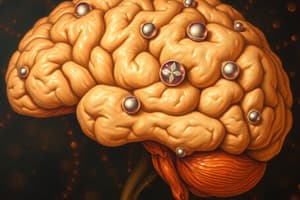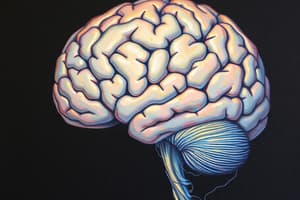Podcast
Questions and Answers
What is Biological Psychology?
What is Biological Psychology?
The study of the physiological, evolutionary, and developmental mechanisms of behavior and experience.
What are the four types of biological explanations of behavior?
What are the four types of biological explanations of behavior?
- Physiological (correct)
- Evolutionary (correct)
- Ontogenetic (correct)
- Functional (correct)
Dualism is the belief that the mind and body are different kinds of substances.
Dualism is the belief that the mind and body are different kinds of substances.
True (A)
What is the concept that suggests mind and brain interact at a single point?
What is the concept that suggests mind and brain interact at a single point?
Which of the following is NOT a form of monism?
Which of the following is NOT a form of monism?
What is a gene?
What is a gene?
What is the difference between homozygous and heterozygous genes?
What is the difference between homozygous and heterozygous genes?
Recessive genes show effects only in homozygous conditions.
Recessive genes show effects only in homozygous conditions.
Flashcards are hidden until you start studying
Study Notes
Biological Psychology Overview
- Biological Psychology studies physiological, evolutionary, and developmental mechanisms of behavior and experience. It is also known as biopsychology, psychobiology, physiological psychology, or behavioral neuroscience.
- The field aims to connect biological aspects with psychological issues.
Biological Explanations of Behavior
- Physiological: Links behavior to brain and organ activity. Example: Low dopamine levels cause involuntary movements.
- Ontogenetic: Examines the development of structures or behaviors, influenced by genes, nutrition, and experiences. Example: Impulse control develops from infancy to adolescence.
- Evolutionary: Investigates the evolutionary history of structures or behavior. Example: Goosebumps help animals appear larger when frightened.
- Functional: Explains the purpose of a structure or behavior. Example: Camouflage aids in an animal's survival by hiding it from predators.
The Mind - Brain Relationship
- Addresses the mind-brain problem, questioning how they interact.
- Dualism: Proposes mind and body are distinct and independent substances, with Descartes suggesting interaction occurs in the pineal gland. This view is largely rejected today.
- Monism: Argues only one substance exists, encompassing:
- Materialism: Everything is physical, and psychological experiences are explained through physical terms.
- Mentalism: Only the mind exists; the physical world depends on it.
- Identity Position: Mental processes and specific brain activities are identical; mental experiences stem from brain activity.
Consciousness and Brain Activity
- Monism is a working hypothesis but not definitively proven.
- Stimulation of brain areas elicits experiences; mental activity necessitates brain activity.
- The "hard problem" questions why consciousness exists at all in a physical world, positing that brain activity does not generate consciousness, nor does consciousness cause brain activity.
Genetics of Behavior
- Genes are segments of chromosomes, consisting of DNA, which templates RNA production, leading to proteins critical for body structure and chemical regulation.
- Homozygous: Identical gene pairs on chromosomes; heterozygous: unmatched gene pairs.
- Dominant genes: Exhibit strong effects in homozygous or heterozygous conditions.
- Recessive genes: Manifest effects only in homozygous conditions.
Studying That Suits You
Use AI to generate personalized quizzes and flashcards to suit your learning preferences.





